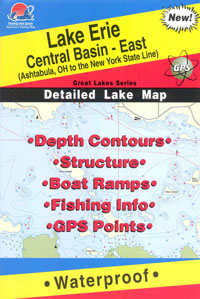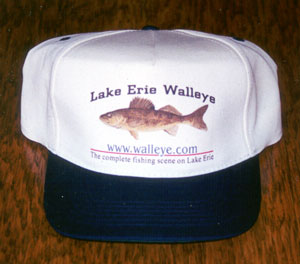Head South for More Walleyes
by Rick Olson
If you develop an itch to get in some early season walleye action you
can scratch it by looking for a warmer climate and taking a due south
heading. There are plenty of opportunities for open water walleye spread
throughout the south and includes states like Arkansas, Missouri, and
even Kentucky. While theSouth and good walleye fishing arenít exactly
synonymous it is a possibility, especially if you know a little about
the when, where, and how.
scratch it by looking for a warmer climate and taking a due south
heading. There are plenty of opportunities for open water walleye spread
throughout the south and includes states like Arkansas, Missouri, and
even Kentucky. While theSouth and good walleye fishing arenít exactly
synonymous it is a possibility, especially if you know a little about
the when, where, and how.
Big southern reservoirs like Cumberland in Kentucky, Lake Norfork and
Bull Shoals in Arkansas, and Lake Stockton in Missouri are just a few of
the bodies of water that have fishable numbers of walleyes.
Fishable numbers means that thereís enough walleyes present to make it
worth your while to pursue. Without the numbers you can feel like
your looking for a needle in a haystack, which can be a little
frustrating. You better believe the numbers are there, even more than
you might think.
For example; Bull Shoals was on last yearís list of tournament sites
for the In-Fisherman Professional Walleye Trail and there was a little
apprehension going in. Southern tournaments in the past have made for
tough fishing, although we did catch at least a few fish and learn
something every time we made a trip. Bull Shoals really opened the eyes
of everybody that participated in the tournament and the action was
exceptional. So much so that is was the best fishing we had during the
entire season, including all of the tournaments held on the tremendous
fisheries of the North. Everybody has a favorite lake to fish and Bull
Shoals has made itís way into my top ten list, and maybe even top five.
Making a southern run early in the season can put you in the right
place at the right time and be a peak time of the year for finding
schools of walleyes bunched up in areas that are easy to identify. Even
though the spawning season is not usually associated with good walleye
fishing, itís one of your best bets for finding heavier concentrations
of fish.
Southern walleyes behave like they do anywhere else, and the spawning
season is no different. Classic movements include upstream migrations
that lead walleyes up incoming rivers, as well as to the back ends of
coves and arms with feeder creek. Once the actual spawning has
taken place walleyes can be expected to hang around for several weeks or
more, before slowly filtering back into the main lake. Theyíll hang
around because thatís where most of the baitfish can be found; seeking
out the warmer temps that shallow water can provide.
Warmer water temperatures is a draw for many species of fish,
including walleyes, bass, stripers and crappies. In fact walleyes may be
in the minority, but donít let that bother you. Catching bass, stripers,
and giant crappies can provide plenty of action and fun, and will help
keep you entertained during your search for southern gold.
Because of so many other species that might be available solely
relying on your electronics to find walleyes becomes an impossibility.
While they can help determine the presence of bait and predators, they
canít determine the species. On the other hand good electronics like the
Raymarine C120 are still a must for finding underwater shelves and
points, as well as baitfish and game fish, no matter what it is.
The Raymarine C120 has an incredibly brilliant 12 inch color display
that can combine HDFI (which is High Definition Fish Imaging), along
with G.P.S. and even radar. The HDFI can actually breakout and display
individual bait fish in a school and show you much more of what youíve
been missing. The G.P.S. chart plotter can use and display the Navionics
Gold maps which will help keep you from getting lost and into trouble,
especially when youíre on a body of water youíve never been on before.
On many of the big reservoirs every arm and bay looks the same and itís
much too easy to get confused. With the Navionics map displayed you know
exactly where your are, where youíve been, and all in relation to any
structure or contour line that you might be over.
If you know where you are and youíre where you want to be, the only
way to know for sure if there are any walleyes around is to put a fish
or two in the boat, and when the fun really begins. Thereís more than
one way to get the job done, but a spinner and crawler rates high on the
list. Leeches have also proven to be extremely productive but are next
to impossible to find so early in the season.
A spinner and live bait combination behind a bottom bouncer will
allow you to cover some water and give the bait a small amount of speed.
Early season post spawn walleyes can be caught; Itís simply a matter of
keeping a solid presentation in the right place.
The back ends of creek arms can be loaded with debris including
trees, brush, rocks and shale, all of which will give you fits if youíre
not prepared. Getting a bouncer and spinner through that kind of stuff
can be tough to say the least, but is possible with a minor adjustment.
Simply shortening up your snell length will help keep your bait from
dragging on the bottom and can make a real difference in how much time
you spend hung up and re-tying.
Good places to drag a bouncer includes shallow flats, break lines,
and near the edge of flooded brush and vegetation. The key is trying to
cover everything as location can vary from day to day and you just donít
know for sure.
Pitching jigs to shallow brush or vegetation is another option, and
may be a good choice if you feel spooking may be a factor. Spooking can
become a real problem if youíre working shallow water, especially if
itís relatively clear.
Although walleyes are often thought of as being most active early in
the morning and late in the day itís not always so, especially early in
the season. In fact, activity will often increase as the sun gets higher
and the shallows start to warm up. It can also bring walleyes into
extremely shallow water, like a few feetor less. Itís a factor to be
aware of, and a solid game plan will always include a good amount of
shallow water.




 scratch it by looking for a warmer climate and taking a due south
heading. There are plenty of opportunities for open water walleye spread
throughout the south and includes states like Arkansas, Missouri, and
even Kentucky. While theSouth and good walleye fishing arenít exactly
synonymous it is a possibility, especially if you know a little about
the when, where, and how.
scratch it by looking for a warmer climate and taking a due south
heading. There are plenty of opportunities for open water walleye spread
throughout the south and includes states like Arkansas, Missouri, and
even Kentucky. While theSouth and good walleye fishing arenít exactly
synonymous it is a possibility, especially if you know a little about
the when, where, and how.